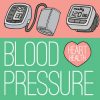May is National High Blood Pressure Education Month, and in an effort to create awareness of elevated blood pressure and its related conditions, Consulate Health Care would like to provide you with some information that we hope will help you stay healthy. According to the National Center for Health Statistics, high blood pressure, high cholesterol, and smoking are all key risk factors for heart disease. This week we’re focusing on blood pressure and its important relationship to heart health.
Blood pressure is usually measured with a small, portable instrument called a blood pressure cuff (sphygmomanometer). The blood pressure cuff consists of an air pump, a pressure gauge and a rubber cuff. The instrument measures the blood pressure in units called millimeters of mercury (mm Hg).
- High blood pressure (hypertension) is designated as either essential (primary) hypertension or secondary hypertension and is defined as a consistently elevated blood pressure exceeding 140/90 mm Hg.
- In essential hypertension (95% of people with hypertension), no specific cause is found, while secondary hypertension (5% of people with hypertension) is caused by an abnormality somewhere in the body, such as in the kidney, adrenal gland, or aortic artery.
- Essential hypertension may run in some families and occurs more often in the African American population, although the genes for essential hypertension have not yet been identified.
- High salt intake, obesity, lack of regular exercise, excessive alcohol or coffee intake, and smoking may all adversely affect the outlook for the health of an individual with hypertension.
- High blood pressure is called “the silent killer” because it often causes no symptoms for many years, even decades, until it finally damages certain critical organs.
- Poorly controlled hypertension ultimately can cause damage to the blood vessels in the eye, thickening of the heart muscle and heart attacks, hardening of the arteries (arteriosclerosis), kidney failure and strokes.
- Heightened public awareness and screening of the population are necessary to detect hypertension early enough so it can be treated before critical organs are damaged.
- Lifestyle adjustments in diet and exercise and compliance with medication regimens are important factors in determining the outcome for people with hypertension.
- The goal of therapy for hypertension is to bring the blood pressure down to an acceptable level in the general population and to even lower levels in diabetics, African Americans, and people with certain chronic kidney diseases.
- Screening, diagnosing, treating, and controlling hypertension early in its course can significantly reduce the risk of developing strokes, heart attacks or kidney failure.
For more information, read about 3 more important facts about heart disease, published by Consulate Health Care.
If you found an error, highlight it and press Shift + Enter or click here to inform us.



